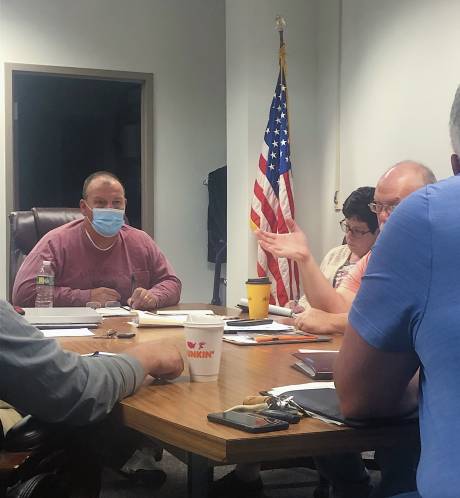The reality that “once you’re in, you can never leave” has Le Roy Town and Village board members taking a cautious approach to any potential participation in the state’s new Marijuana Regulation & Taxation Act.
Officials from both governing bodies gathered with about a dozen residents at the Town Hall courtroom Monday night for what turned out to be a 30-minute discussion on the recently passed legislation that immediately permits the recreational use of marijuana for residents 21 years of age and older.
The MRTA also opens the door for retail dispensaries and onsite consumption spaces, which likely are a couple years away from implementation.
“Part of this that concerns me is that if you’re in, you’re in forever and you can’t opt out,” Le Roy Town Supervisor James Farnholz said. “But if you’re out, you can jump in if it’s working (elsewhere).”
The “opt in” and “opt out” terminology applies to cities, towns and villages who may or may not want to have pot stores or lounges within their borders. Opting in means that the municipality would be eligible for the tax revenue imposed by the state on marijuana sales; opting out could lead to a public referendum, which could overturn that decision.
In any event, the deadline to decide is Dec. 31 of this year. But with the state still trying to figure out all the rules and regulations attached to the law, many local governmental leaders seem to be in no hurry.
Le Roy Village Mayor Greg Rogers said he is part of that group.
“We’re going to take as much time as we can – right to the end of December – because we believe the landscape will change eight or nine times until then,” he said.
As previously reported on The Batavian, the state is establishing the Office of Cannabis Management & Marijuana Control Board, which will have an executive director and will be housed inside the New York State Liquor Authority.
The office will implement regulations for production, licensing, retail, packaging, labeling and use, with the first sales not expected until 2022 or early 2023.
Currently, 18 states plus the District of Columbia, the Northern Mariana Islands and Guam have legalized cannabis for adult use. Another 13 states and the U.S. Virgin Islands have decriminalized its use.
Farnholz said he doesn’t support a local law that would supersede the fact that marijuana is considered a Class One drug at the federal level.
“If you opt out, then down the road you can take some more time and see how it plays out in other communities. You then would have the opportunity to opt in or, in my opinion, if the federal government were to remove it as a Class One drug and it became legalized on a federal basis – to me that changes the discussion significantly,” he said.
He said the dispensary or consumption site can not be within 500 feet of a school or 200 feet from a place of worship, and that restriction – if not changed – would mean that Main Street in the village would be out due to the number of churches along Route 5.
In any event, Farnholz said the emphasis leading to a decision should be on what the law would mean to municipalities, not the morality of legalized marijuana.
“I don’t want to go down the road if legalized marijuana is good or bad,” he said. “We all have our opinions.”
Whiting said that municipalities are limited in what they can pass to just the two areas -- dispensaries or onsite consumption spaces.
“Other than that, the municipalities’ hands are tied and restricted,” he said.
Rogers said he is convinced that “somewhere in Genesee County, someone is going to sell it” but as far as Le Roy is concerned, he said the village board is going to discuss the possibility of a public referendum “to let the people decide if that is something that they want.”
A local law is subject to a permissive referendum, Whiting said, meaning that if 10 percent of the voters who last voted in the prior gubernatorial race sign a petition, there would have to be a referendum.
Several topics came up during the discussion, including the taxation schedule, drug impairment recognition, information from the state of Colorado, increased costs of public safety and federal law enforcement’s involvement.
Tax Revenue Split
Whiting pointed out that there is a 25/75 split between Genesee County and the municipality that allows the dispensary and the onsite spaces.
Specifically, the sales tax on cannabis will be 13 percent, with 9 percent going to the state, 3 percent to the host municipality and 1 percent to the county. Additionally, a THC (tetrahydrocannabinol) excise tax will be imposed.
David Damico, a resident and school teacher, said he’s all for the tax revenue but is concerned because he’s around teenagers all the time.
“I do think that whatever we decide to do tonight, that those who want it will get it,” he said. “We’re almost within walking distance of multiple villages that might opt in, including the big one down the road (Batavia), which is much bigger than us. So, I’m not really sure that keeping it off the books here is going to deter anybody.”
Farnholz replied, “I’m not sure we’ve deterred anybody since 1975,” adding that he spent 30 years as an educator and shares Damico's concerns.
Rogers said that “as far as the taxation and revenue goes, I don’t think our boards should make a decision based on thinking they’re going to get a boatload of tax revenue … This is a bigger issue than that for the social aspect.”
Recognizing Those Impaired by Pot
Farnholz said that local judges he has spoken to have a “grave concern” over it because of the lack of standards in testing for impairment.
Whiting said courses are available for law enforcement personnel to learn to recognize and detect marijuana impairment but they’re very time consuming.
Town Councilperson John Armitage mentioned that it takes a full year to train a police officer to become a DRE (Drug Recognition Expert).
“Paying this officer overtime, bringing in extra manpower – it is astronomical – and we’re not talking one or two deputies … you would have to have multiple deputies trained in DRE,” he said. “And the amount of tax you think you’re going to get, you’re not going to get (due to increased expense incurred for public safety and related services).”
Stein on Colorado: Unintended Consequences
Rochelle Stein, Genesee County Legislature chair, advised the boards that the county has no authority in this legislation before providing information from Colorado, which is one of the states that have legalized cannabis.
“The cost to public safety in that state has risen due to the sale of marijuana and the cost of public safety will be borne by the taxpayers when those costs go up (here),” she said. “The mental health, the physical health – those costs have also risen in Colorado. Incidentally, they will also tell you that the black market of cannabis has benefited greatly in Colorado.
“If there are some lessons to be learned, I would suggest that we look at Colorado and to see their experiences there. I would absolutely welcome the opportunity to opt out, preserve whatever you can for the future. If I were in your shoes, that’s what would do.”
Armitage agreed with Stein, adding that before any decision is made, board members need to look at these other states.
“I will tell you that Colorado’s accident rate is up over 400 percent since legalization, and that costs have increased more than the revenue that has been taken in,” he said.
Public Safety Costs a Major Concern
Armitage compared the MRTA to the influx of casinos, which in many cases have led to increase crime and public safety budgets.
“This is one of the worst ideas I have seen the state come up with yet, especially when other states have done it and you can see their numbers – it just does not work,” he said.
Stein also brought up that the dogs used as K-9 officers and their handlers would have to be retrained, which is another expense.
Resident Nikki Calhoun said that putting on two or three more village police officers “would be a significant cost to the village and eventually that will have to be passed on (to the taxpayers).”
“And, of course, the village can’t respond to other towns and Genesee County has limited resources for the sheriff’s on this side of the county, so I think you’ll have more problems,” she said.
Feds’ Involvement in Question
Whiting said states will be on their own when it comes to enforcement.
“My guess is that enforcement of marijuana consumption by the federal government will be very few and far between,” he said. “I’m sure they’re going to interdict large quantities coming into this country, but my hunch is that U.S. attorneys’ offices are not looking to prosecute anyone for personal consumption of marijuana.”
Resident Jay Beaumont opined that ultimately the federal government will leave it up to the states, calling it “ludicrous” that the feds classify marijuana as a Class One drug.
He also said he sees many changes from New York State before the end-of-the-year deadline to opt in or opt out.
Will Communities be Lining Up to Opt In?
The point was brought up that other communities will opt in and benefit from the tax revenue.
Farnholz had a different take on the issue.
“Looking at other states, the fantasy from the governor’s office that this is a major economic boon to the municipalities is just that – a fantasy,” he said. “You’re not going to get the financial boon that you think you are from a (cash only) dispensary. Because quite frankly, people will grow their own or the black market flourishes incredibly to avoid paying the 25-, 35-or 40-percent tax.”
Beaumont asked if it could be put to a vote to see what the residents’ feeling toward it is.
“We could do it one of two ways,” Farnholz replied. “Someone could come forward with a permissive referendum, which would be binding, or we could … have a (nonbinding) vote to gauge the feeling of the community (as the town did with the ambulance a couple years ago).”
Whiting said he expects more details to be released on a regular basis, which “will give us a lot of these answers.”







